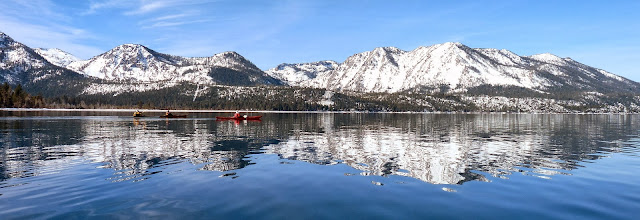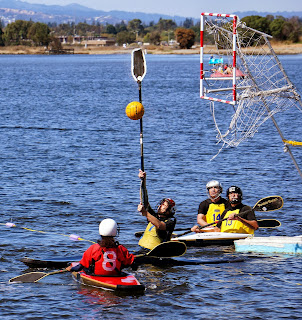 |
| Looks hardcore but really just got left behind when the wave receded. |
First, this was in an advanced class - rough water rescues. The student in question had solid rescues - quick T rescues and scrambles in confused four foot swells bouncing off rocks. That puts him far ahead of many club members and many experienced paddlers. He also had a roll. Not completely reliable yet, but a solid roll that worked when he needed it. I know quite a few paddlers who venture out on the ocean in fairly rough conditions without knowing how to roll. Once again, my student was well ahead of the game.
Second, the club isn't really hardcore. I've never seen a club that is. That isn't to say that there aren't some very skilled paddlers in the club, and some that do gnarly paddling. But clubs always consist of a wide variety of paddlers. I would venture to say that the majority of any sea kayaking club are people who go no further than well protected ocean paddler. Many never experience swells. And that's great - there's so much beauty, fun, and variety to be had on flat water paddles. Any club that has open membership is going to end up with a range of members and that diversity means the club as a whole is not hardcore. Individual members may vary.
 |
| Looks cold but the air temp was 50 deg. and we had dinner at a nice restaurant after. |
The third reason the statement was funny is that hardcore is a silly term. What's it mean? Do you have to paddle near rocks? Or in really big waves? Does it mean you launch before dawn? Or does paddling without any chocolate count as hardcore? Everyone's going to have a different opinion and all of them are valid so all of them are slightly meaningless. We can probably agree that circumnavigating Australia is hard core. Anything less becomes arguable.
In the end I highly encouraged my student to go ahead and join the club already. Like most paddling clubs, it's filled with friendly people of all levels who enjoy new members. Joining a club is a great way to meet people at your level and it's a great way to start paddling with people at a higher level - that's how you improve. Hardcore is not a prerequisite and isn't even a goal for most people. Clubs wouldn't survive if they didn't welcome newcomers and transfer knowledge.
 |
| The wave is all foam and dies out in ten feet. |
While this 'hardcore' talk is natural, and everyone wants to excel in their sport, I think the mindset of many folks is a bit off. I've seen more and more people getting into rock gardening, more people getting into rough water play. I think that's great. But it's not necessarily hardcore. To be honest, it often isn't even advanced paddling. It's fun. Some of it requires good skills. But lots of it just requires solid rescue skills (which should learned early on in one's paddling career) and good judgment. I've seen plenty of people doing 'hardcore' stuff who have limited skills and experience, sometimes even limited judgment. I don't think that makes you hardcore.
Those of us who enjoy rock garden paddling, especially those with advanced skills and lots of experience, should be more aware of the perception we create. Without meaning to, we can easily disregard the other aspects of the sport in favor of our exciting stories. I know I talk about my adventures a lot - right here on the blog. But I also write up my flat water paddles. I also share the simple things I do. I celebrate all levels of paddling and appreciate those who don't want thrills but merely enjoyment. I know quite a few truly hardcore paddlers and they feel the same way. The 'hardest' paddlers out there tend talk up the fun and play down the danger.
 |
| As easy as it looks. |










